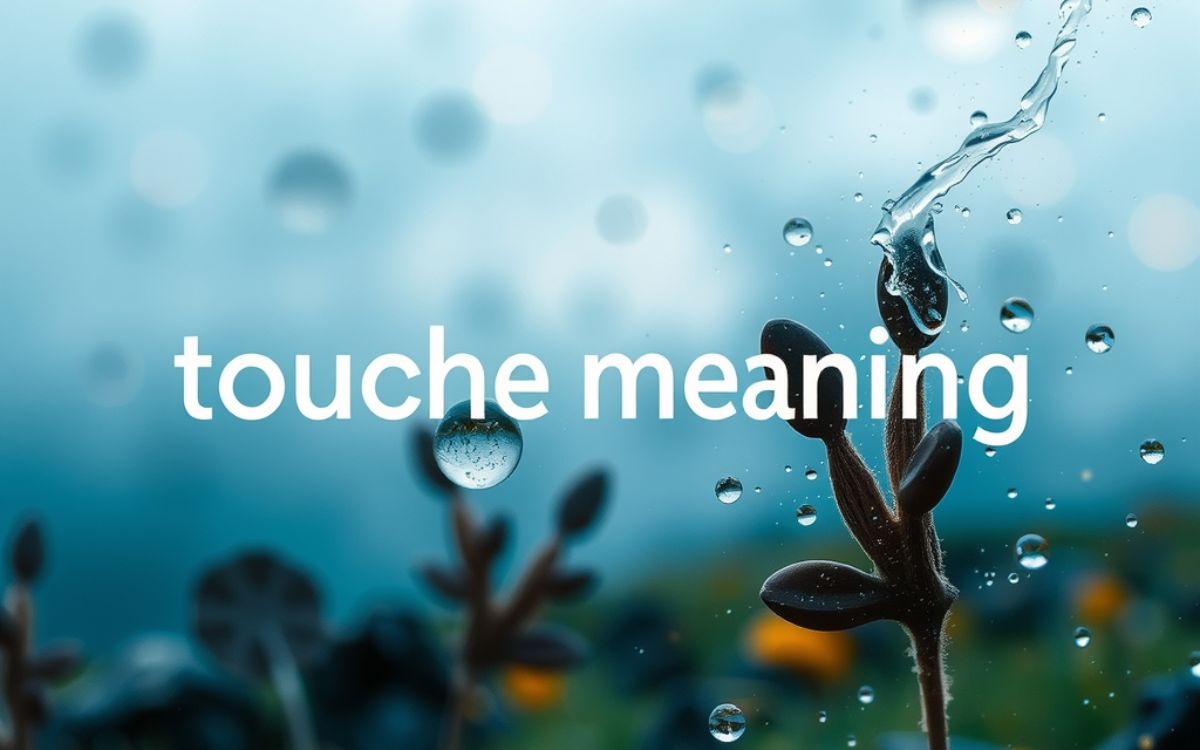Have you ever been in a playful argument where someone delivers the perfect comeback, and all you can do is smile and say, “Touché”? This little word slips into conversations more often than you might notice, and it always carries a clever punch.
The beauty of “Touché” is that it comes from French, yet English speakers have adopted it to capture moments of witty surrender. Instead of dragging out a debate, one word neatly says, “You got me there” or “Fair point.” That’s why it feels both classy and casual at the same time.
In this guide, we’ll break down exactly what “Touché” means, how to use it naturally, and why it has stuck around in everyday speech. Plus, you’ll see simple examples so you can start dropping it into your own conversations with confidence.
What Does “Touché” Actually Mean?
The word “Touché” comes from French fencing. When one fencer landed a hit, they’d say “Touché!” meaning “touched.” Over time, English speakers borrowed it, and today it’s used outside fencing.
In everyday conversation, “Touché” means “Good point” or “You got me there.” It’s a playful way of admitting the other person’s comeback was sharp.
What Does Touché Mean in Slang?
In slang, “Touché” is a quick way to acknowledge someone’s wit. Imagine arguing with a friend about who does the dishes, and they say, “I cooked last night.” If you laugh and say “Touché,” you’re basically admitting they won the round.
How Do You Use Touché Correctly?
You use it in lighthearted conversations, never in heavy or sensitive ones.
Example:
Friend: “You always say you’re busy, but you’ve binge-watched three shows this week.”
You: “Touché.”
That’s how it works: quick, witty, and respectful.
Is Touché a Compliment?
Yes, most of the time. Saying “Touché” is like tipping your hat to someone’s cleverness. It shows you recognize their smart remark. But keep in mind—tone matters.
Why Do English Speakers Say “Touché”?
English has borrowed many French words, but “Touché” stuck because it’s short, stylish, and expressive. People love how it captures both humor and respect in one word.
When Someone Replies “Touché,” What Do They Mean?
They’re saying: “You made a good point, and I admit it.” Sometimes it’s playful, sometimes serious, but it always shows acknowledgment.
Can Touché Be Used Sarcastically?
Absolutely. If someone says something obvious and you respond with a flat, slow “Touché,” it can sound mocking. Context and tone decide whether it feels sincere or sarcastic.
Is Touché a Positive Word or Negative?
Most of the time, “Touché” feels positive. It signals respect for another person’s wit. But if said sarcastically, it can turn negative.
Does Touché Mean “Touchy”?
Nope. “Touché” and “Touchy” are completely different. Touché means acknowledgment, while touchy means sensitive or easily upset.
Is Touché Good or Bad?
It’s usually good. Think of it as a conversational thumbs-up. But again, sarcasm can flip it into a jab.
Examples of “Touché” in Everyday Conversation
At work:
Colleague: “You skipped the meeting, but sent three memes during it.”
You: “Touché.”
With siblings:
Brother: “You call me lazy, but who left the dishes for three days?”
You: “Touché.”
Pop culture: Movies and shows often use “Touché” during witty banter. It’s become a classic line for clever comebacks.
When Was “Touché” First Used in English?
“Touché” first appeared in English in the 19th century, carried over from fencing manuals and literature. By the early 1900s, it had become a common witty remark in conversation.
Related Words and Phrases (Synonyms)
Ditto: Used to agree with someone, though less playful.
Fair enough: Similar, but more neutral.
Good point: Straightforward English version of “Touché.”
These words share the same spirit but lack the stylish flair of “Touché.”
Conclusion
At its core, “Touché” is a simple yet powerful word that signals respect for someone’s cleverness. It adds humor, humility, and a touch of elegance to everyday conversations, whether you’re admitting defeat in a playful debate or recognizing a sharp remark.
The key is using it with the right tone and context. In most cases, it feels positive and lighthearted, but with sarcasm, it can take on a sharper edge. Now that you know its meaning, history, and examples, you can confidently slip “Touché” into your own chats and enjoy how naturally it elevates your conversations.
FAQs
What does touché mean in slang?
In slang, “Touché” means admitting someone made a clever point or comeback, often in a playful, witty, or slightly competitive conversation.
How do you use a touche correctly?
You use “Touché” after someone makes a sharp remark. It’s a quick way to acknowledge their wit without dragging the conversation further.
Is touché a compliment?
Yes, saying “Touché” usually acts as a compliment. It shows respect, admiration, or acknowledgment of someone’s clever or accurate statement.
Why do English people say “touche”?
English speakers say “Touché” because it elegantly expresses recognition of wit. Borrowed from French fencing, it’s stylish, concise, and widely understood in debates.
When someone replies “touche”?
If someone replies “Touché,” they’re admitting your point was sharp or valid. It’s a lighthearted acknowledgment of conversational defeat or wit.
What does ditto mean in slang?
In slang, “Ditto” simply means “same here.” It’s a quick way of agreeing or showing that you feel exactly the same way.
Can touché be used sarcastically?
Yes, “Touché” can be sarcastic. The tone decides whether it’s playful respect or a mocking jab at someone’s obvious or silly remark.
When was Touche first used?
“Touché” was first used in English during the 19th century. It came from French fencing, where it literally meant “touched” in combat.
What is an example of Touche?
Example: Friend says, “You skipped gym but bought pizza.” You reply, “Touché.” It’s a playful way to admit they caught you off guard.
Is “touche” a positive word?
Most often, “Touché” is positive. It signals humor and respect for wit. But sarcastic delivery can twist it into a negative or mocking remark.
Does “touche” mean “touchy”?
No, “Touché” and “Touchy” are unrelated. Touché means acknowledgment of wit, while touchy means overly sensitive or easily offended in conversation.
Is Touche good or bad?
“Touché” is usually good, showing respect or humor. But depending on tone, it can also be sarcastic, making it feel slightly negative.

Welcome to Bloomnis.com! I am the admin, here to bring you the best jokes and laughter. My goal is to make your day brighter with funny content. Enjoy jokes, puns, and humor anytime. Keep smiling and have fun with us. Laughter is the best medicine!
















